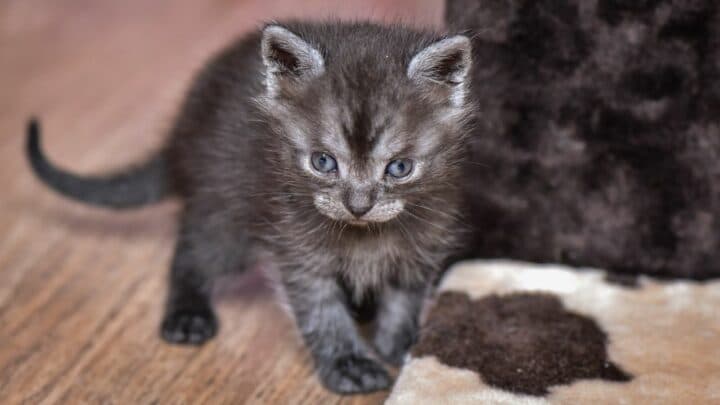No matter where you obtained your kitten, it can develop problems that cause it to have a potbelly appearance.
For example, a bloated or distended belly can signify parasites, not as prevalent in adult cats. Or it could be a problem with their underdeveloped digestive system and the food they are eating.
Either way, they need immediate care. If they are defecating with little problem, then it is not likely their digestive system is.
However, parasites can cause bloating, and in some instances, hardness of the abdomen that feels somewhat knotty.
Kittens can have congenital defects to their digestive systems that may not appear until they eat solid food.
So, if you know what you are looking for, you can determine if your kitten has parasites, a bout of gas from its food, or something more life-threatening.
If your kitten has a potbelly and you want tips on what to do for it, continue reading for more information about why your kitten has a potbelly appearance.
My kitten has a potbelly appearance, is it normal?
Kittens can get bloated once you remove them from mother’s milk and introduce them to solid food. If they remain bloated, though, after defecating, your kitten may have a problem. Parasites and a poor diet can cause your kitten to get a potbelly that will not recede.
Your Potbelly Kitten has a Genetic Disorder
If worming your kitten and changing its food does not affect its distended belly, you need a vet to determine the cause.
Kittens can be born with genetic disorders that affect their digestive systems. Commonly seen in kittens is a malformation called atresia ani that occurs while the baby is still in the womb.
As a result, the kitten fails to develop an anal opening. It will do okay after birth as long as it is dieting on mother’s milk.
Once it is weaned, and transitions to solid food is when problems begin.
Once the baby is put on solids, the bloat begins and the waste cannot exit its little body properly. A veterinarian can determine what your kitten’s problem is.
Fortunately, surgery can correct atresia ani if you have a healthy kitten and get it to the vet in time.
Feeding your Kitten the Wrong Food
The milk a kitten gets from its mother is perfectly balanced for its consumption. However, there are milk alternatives, and they can cause bloating, constipation, and other problems for kittens.
Cats cannot process carbohydrates and humans, as they lack the enzymes necessary to do so. Because of this, some cats may not tolerate the increased carbohydrates of processed cat food very well.
Especially kittens, whose digestive systems are barely developed.
When their diet becomes higher in carbohydrates, kittens are especially prone to gassiness, loose stools, and stinky stools.
This gassiness is because their little digestive systems lack what is necessary to break the food down properly.
Compared to dry food, canned food contains higher protein. You can try it if your kitten is having bloating issues when being weaned from its mother.
You can also purchase kitten food specially formulated for their developing digestive systems.
It may take a couple of tries before getting their diet right and finding food they will eat that doesn’t give them a pot belly appearance.
What to do for My Potbelly Kitten
You can buy worm medicine for your kitten at your local farm or pet store that you can give to it at a few weeks of age. If you purchase this medicine, read the instructions carefully before dispensing.
If your kitten is healthy, eating, drinking, and defecating as it should, and is otherwise okay, worming it should eliminate the potbelly.
Before a visit to the vet or changing its diet, worming your kitten may be all you need to do to make your baby feel better.
However, if it has a potbelly, is listless, won’t eat, and is not passing stools, your kitten may have a bigger problem than parasites.
If this is the case, it is time to visit the vet to determine what is wrong with your kitten.
Frequently Asked Questions about Kittens with a Potbelly Appearance
Can atresia ani kill my kitten if untreated?
Atresia ani can kill your kitten, and it may not do so immediately. Your kitten may suffer from constipation and be able to pass part of the food it has digested. However, without treatment, it will always have problems with digestion.
What if I cannot find food that my kitten can and will eat?
Many pet owners with finicky kittens and cats who do not do well on processed cat food will make food for them. In addition, many recipes are available online if you want to prepare your kitten’s food from scratch.
Now you Know Why your Kitten can have a Pot Belly Appearance
Kittens are a pleasure. However, when one is not feeling well, we can feel helpless in our desire to make it better.
Being proactive and worming your kitten early can ensure that parasites are not an issue to be concerned with if your kitten develops a bloaty belly.
If parasites are not causing the bloat then it could be your kitten’s diet, and a few days after a change should show improved results.
However, if your kitten exhibits any of the symptoms of atresia ani, then get it to your veterinarian immediately to help you make it well.


